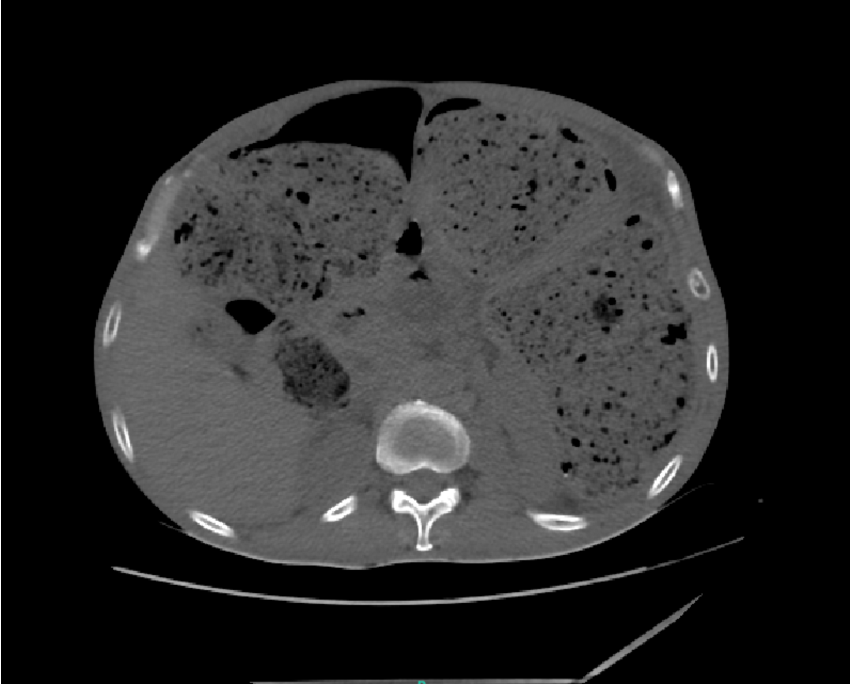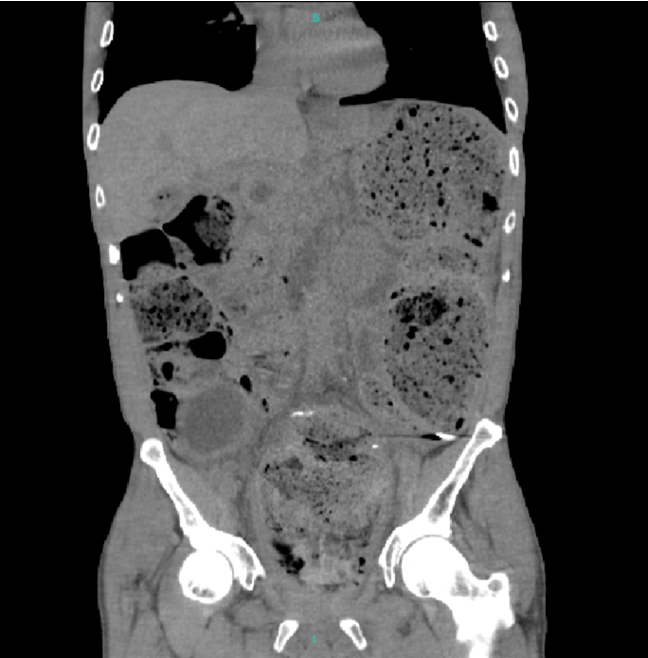Monday Poster Session
Category: Functional Bowel Disease
P2969 - Bowel Patrol: When Methadone Maintenance Meets Megarectum
Monday, October 27, 2025
10:30 AM - 4:00 PM PDT
Location: Exhibit Hall

Belissa Lopez-Peña, MD (she/her/hers)
San Juan City Hospital
San Juan, PR
Presenting Author(s)
Belissa Lopez-Peña, MD1, Maniel A. Ruiz-Ramos, MD1, Natalia Canevaro-Lugo, MD1, Juan Ruiz-Ramos, MD, ABIM2, Cristina Joy-Perez, MD1, Wilfredo Gordo-Febo, MD3, Carolina Machado-De la torre, MD3
1San Juan City Hospital, San Juan, Puerto Rico; 2San Juan City Hospital, San Juan City, Puerto Rico; 3San juan City Hospital, San Juan, Puerto Rico
Introduction: Stercoral colitis, though uncommon, is a potentially life-threatening complication of opioid-induced constipation (OIC). Methadone, a long-acting μ-opioid receptor agonist, is known to markedly slow gastrointestinal transit. Sustained fecal retention may lead to colonic wall ischemia, necrosis, and perforation. Early recognition is critical to preventing fatal outcomes, especially in patients undergoing opioid maintenance therapy.
Case Description/
Methods: A 53-year-old man on methadone maintenance therapy of 140 mg daily that presented with one month history of worsening abdominal distension, pain, and intractable constipation. He had not passed stool in over three weeks despite using over-the-counter laxatives and stool softeners. On examination, the abdomen was distended and tympanic with hypoactive bowel sounds. Laboratory data revealed leukocytosis (WBC14.8×10⁹/L) and elevated C-reactive protein (92 mg/L). Non-contrast CT of the abdomen and pelvis showed severe fecal impaction in the rectosigmoid colon, colonic dilation consistent with megarectum measuring about 9 cm, mural thickening, and pericolonic fat stranding—findings indicative of stercoral colitis. Conservative treatment including enemas, osmotic and stimulant laxatives, and manual disimpaction failed. Given increasing discomfort and risk for perforation, the patient underwent surgical disimpaction under general anesthesia. Intraoperatively, a 6-pound stool mass was removed. The colon was edematous but intact. Postoperative recovery was uneventful with restoration of normal bowel function on a comprehensive bowel regimen.
Discussion: Chronic opioid use, particularly methadone maintenance therapy, can lead to serious complications such as stercoral colitis and megarectum due to impaired gastrointestinal motility. While most cases of opioid-induced constipation respond to conservative treatment, this case highlights the critical need for early recognition and escalation when high-risk features emerge. Surgical referral is warranted when medical management fails or imaging reveals signs of impending complications. In this patient, prompt surgical intervention prevented perforation and led to full recovery. Preventive strategies—including structured bowel regimens, use of peripherally acting μ-opioid receptor antagonists, and standardized OIC screening—are essential to mitigate morbidity in long-term opioid users.

Figure: CT abdomen (axial view) demonstrating extensive colonic fecal loading with a large fecaloma in the descending colon. Associated mural thickening and pericolonic fat stranding are consistent with stercoral colitis.

Figure: CT abdomen and pelvis (coronal view) showing marked rectal and sigmoid colon distension consistent with megarectum. Severe fecal impaction is evident, with no signs of perforation.
Disclosures:
Belissa Lopez-Peña indicated no relevant financial relationships.
Maniel Ruiz-Ramos indicated no relevant financial relationships.
Natalia Canevaro-Lugo indicated no relevant financial relationships.
Juan Ruiz-Ramos indicated no relevant financial relationships.
Cristina Joy-Perez indicated no relevant financial relationships.
Wilfredo Gordo-Febo indicated no relevant financial relationships.
Carolina Machado-De la torre indicated no relevant financial relationships.
Belissa Lopez-Peña, MD1, Maniel A. Ruiz-Ramos, MD1, Natalia Canevaro-Lugo, MD1, Juan Ruiz-Ramos, MD, ABIM2, Cristina Joy-Perez, MD1, Wilfredo Gordo-Febo, MD3, Carolina Machado-De la torre, MD3. P2969 - Bowel Patrol: When Methadone Maintenance Meets Megarectum, ACG 2025 Annual Scientific Meeting Abstracts. Phoenix, AZ: American College of Gastroenterology.
1San Juan City Hospital, San Juan, Puerto Rico; 2San Juan City Hospital, San Juan City, Puerto Rico; 3San juan City Hospital, San Juan, Puerto Rico
Introduction: Stercoral colitis, though uncommon, is a potentially life-threatening complication of opioid-induced constipation (OIC). Methadone, a long-acting μ-opioid receptor agonist, is known to markedly slow gastrointestinal transit. Sustained fecal retention may lead to colonic wall ischemia, necrosis, and perforation. Early recognition is critical to preventing fatal outcomes, especially in patients undergoing opioid maintenance therapy.
Case Description/
Methods: A 53-year-old man on methadone maintenance therapy of 140 mg daily that presented with one month history of worsening abdominal distension, pain, and intractable constipation. He had not passed stool in over three weeks despite using over-the-counter laxatives and stool softeners. On examination, the abdomen was distended and tympanic with hypoactive bowel sounds. Laboratory data revealed leukocytosis (WBC14.8×10⁹/L) and elevated C-reactive protein (92 mg/L). Non-contrast CT of the abdomen and pelvis showed severe fecal impaction in the rectosigmoid colon, colonic dilation consistent with megarectum measuring about 9 cm, mural thickening, and pericolonic fat stranding—findings indicative of stercoral colitis. Conservative treatment including enemas, osmotic and stimulant laxatives, and manual disimpaction failed. Given increasing discomfort and risk for perforation, the patient underwent surgical disimpaction under general anesthesia. Intraoperatively, a 6-pound stool mass was removed. The colon was edematous but intact. Postoperative recovery was uneventful with restoration of normal bowel function on a comprehensive bowel regimen.
Discussion: Chronic opioid use, particularly methadone maintenance therapy, can lead to serious complications such as stercoral colitis and megarectum due to impaired gastrointestinal motility. While most cases of opioid-induced constipation respond to conservative treatment, this case highlights the critical need for early recognition and escalation when high-risk features emerge. Surgical referral is warranted when medical management fails or imaging reveals signs of impending complications. In this patient, prompt surgical intervention prevented perforation and led to full recovery. Preventive strategies—including structured bowel regimens, use of peripherally acting μ-opioid receptor antagonists, and standardized OIC screening—are essential to mitigate morbidity in long-term opioid users.

Figure: CT abdomen (axial view) demonstrating extensive colonic fecal loading with a large fecaloma in the descending colon. Associated mural thickening and pericolonic fat stranding are consistent with stercoral colitis.

Figure: CT abdomen and pelvis (coronal view) showing marked rectal and sigmoid colon distension consistent with megarectum. Severe fecal impaction is evident, with no signs of perforation.
Disclosures:
Belissa Lopez-Peña indicated no relevant financial relationships.
Maniel Ruiz-Ramos indicated no relevant financial relationships.
Natalia Canevaro-Lugo indicated no relevant financial relationships.
Juan Ruiz-Ramos indicated no relevant financial relationships.
Cristina Joy-Perez indicated no relevant financial relationships.
Wilfredo Gordo-Febo indicated no relevant financial relationships.
Carolina Machado-De la torre indicated no relevant financial relationships.
Belissa Lopez-Peña, MD1, Maniel A. Ruiz-Ramos, MD1, Natalia Canevaro-Lugo, MD1, Juan Ruiz-Ramos, MD, ABIM2, Cristina Joy-Perez, MD1, Wilfredo Gordo-Febo, MD3, Carolina Machado-De la torre, MD3. P2969 - Bowel Patrol: When Methadone Maintenance Meets Megarectum, ACG 2025 Annual Scientific Meeting Abstracts. Phoenix, AZ: American College of Gastroenterology.
